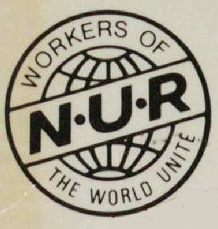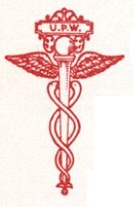Related Research Articles

The Bakers, Food and Allied Workers' Union (BFAWU) is a trade union in the United Kingdom. Founded in 1847 in Manchester, it represents workers in the food industry.

The National Union of Railwaymen was a trade union of railway workers in the United Kingdom. The largest railway workers' union in the country, it was influential in the national trade union movement.

The Ceramic and Allied Trades Union (CATU) was a trade union representing pottery workers in the United Kingdom.
The National and Local Government Officers' Association was a British trade union representing mostly local government "white collar" workers. It was formed in 1905 as the National Association of Local Government Officers, and changed its full name in 1952 while retaining its widely used acronym, NALGO. By the late 1970s it was the largest British white collar trade union, with over 700,000 members. It was one of three unions which combined to form UNISON in 1993.

The Association of Scientific, Technical and Managerial Staffs (ASTMS) was a British trade union which existed between 1969 and 1988.

The Union of Communication Workers (UCW) was a trade union in the United Kingdom for workers in the post office and telecommunications industries.
The National Association of Operative Plasterers (NAOP) was a trade union representing plasterers in the United Kingdom.

The National Union of Distributive and Allied Workers (NUDAW) was a trade union in the United Kingdom.
The United Patternmakers Association (UPA) was a trade union in the United Kingdom.
The National Union of Blastfurnacemen, Ore Miners, Coke Workers and Kindred Trades (NUB) was a trade union in England and Wales which existed between 1888 and 1985. It represented process workers in the British iron and steel industry.
The National Union of Foundry Workers (NUFW) was a trade union representing workers in foundries in the United Kingdom.
The Amalgamated Society of Textile Workers and Kindred Trades (ASTWKT) was a trade union representing textile workers, principally silk manufacturing, in the United Kingdom.
The General Council of the Trades Union Congress is an elected body which is responsible for carrying out the policies agreed at the annual British Trade Union Congresses (TUC).
The National Union of Textile Workers was a trade union representing workers in the textile industry in England, principally in Yorkshire.

The Amalgamated Society of Dyers, Finishers and Kindred Trades was a trade union representing dyers and workers in related jobs in the United Kingdom.
The Associated Blacksmiths, Forge and Smithy Workers' Society (ABFSWS) was a trade union representing metalworkers in the United Kingdom and Ireland.
The Operative Bleachers, Dyers and Finishers Association, also known as the Bolton Amalgamation, was a trade union representing cotton finishers in the vicinity of Bolton.
The Prudential Staff Union was a trade union representing workers at the Prudential insurance company, in the United Kingdom. The only union of insurance workers to affiliate to the Labour Party, it was briefly represented on its National Executive Committee, and for a time sponsored a Member of Parliament.
The National Federation of Insurance Workers (NFIW) was a trade union federation of insurance trade unions in the United Kingdom.
The Chain Makers' and Strikers' Association (CMSA) was a trade union representing workers employed in the manufacture of chains in the United Kingdom, principally in the West Midlands.
References
- 1 2 Arthur Marsh and John B. Smethurst, Historical Directory of Trade Unions, vol.5, p.303
- ↑ Report of the 1963 Trades Union Congress, p.51
- ↑ Parker, James (2017). Trade unions and the political culture of the Labour Party, 1931-1940 (PDF). Exeter: University of Exeter. p. 125.